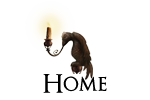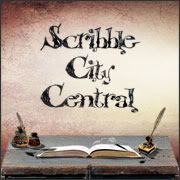"Geras is one of our best novelists for young people interested in the ancient world...." said Amanda Craig ( SCC's Mythic Interviewee No.3) in The Times. I would concur wholeheartedly with that assessment. Adèle's novels Troy and Ithaka took me deep into stories I knew by heart and showed me an entirely different (and entirely engrossing) way to see them. I was, quite simply, entranced--and I can't wait to read the newest one, Dido, when it reaches me. Adèle's love of language shines through everything she writes--the richness of her prose is something to hold up as a fine example to all writers. I am very happy she has agreed to visit Scribble City Central this fifth Friday of the MI series and share her thoughts on myth. Now all I have to do is to get her to love the Celts as much as she does the Greeks...! Welcome, Adele, over to you, (and please can I read that Poseidon does the Eurotunnel story?).
1. Do you think that the retelling of Greek and other myths is important or relevant for the children of today? Why should they care about some “dry old stories” which come from ancient cultures they might never even have heard of?
I think it’s vital for children to have these stories told to them. I’m terrified that there’s a generation growing up which doesn’t have the whole spread of culture laid out for them to feast on, as it were. I’m distressed about things like nursery rhymes ceasing to be common currency and about the only vision of fairy tales being the Disneyfied one. Myths are part of who we are and how we became what we are and anything that keeps them alive has to be a good thing.
2. What age were you when you came across your first myth or myths? Tell us how you felt then about the myths you first discovered. Did you love them or hate them? Did they scare you, excite you—or were you indifferent? What kind of myths were they? Greek? Norse? Native American? Celtic? Or from another culture entirely? Were they in a book you read? Or did you hear them as oral storytelling from someone else?
I think I was 6 years old. My dad bought me a book which I still have called Tales of Troy by Andrew Lang, whose variously-coloured Fairy Books I also had, I think. But T of T really struck a chord with me. I adored the stories and had long passages by heart very quickly, which I was given to reciting at the drop of a hat. The scarier the stories were, the better I liked them. Also fond of love….so the whole Paris/Helen thing appealed to me enormously. But should just say here that Celtic, Norse etc myths were never part of my childhood. I only came across these later and for that reason they are not nearly as important to me and I only know them very sketchily.
3. Looking back, what is your favourite myth of all time, from any culture? And why would you choose it?
I like Pandora’s Box. Or the Dragon’s teeth…that was a good one. No, I’ll plump for Pandora’s Box, I think. Though I don’t like having to choose, I must admit.
4. Who is your most hated mythical hero or heroine, and what made you feel that way about them?
I have to confess to being a little bored by Heracles. Those Augean stables seemed to me a bit too much like housework writ large and muscle doesn’t do much for me in general.
5. Is there a mythical beast you are particularly fond of? If so, which one?
The owl of Minerva! And I’m quite fond of Medusa too….
6. How have myths had an influence on your writing, if at all?
They’ve had an enormous influence as three of my books have Greek gods and goddesses as characters. Troy, Ithaka and Dido. I’m not a religious person in any way, but find myself almost believing in this lot! When there’s an earthquake etc I always think of Poseidon. I once wrote a short story about him travelling on a Eurostar train, and being most offended at mere mortals tunneling under HIS Channel!
7. If you could choose to be the demigod child of any one mythical god or goddess, which one would it be? Which power would you like to inherit from them—and what would you do with it?
Pallas Athene. I ‘d like very much to be wise. And also elegant. I think of Athene as very elegant indeed.
More about Adèle:
Adèle Geras was born in Jerusalem in 1944. She studied Modern Languages at St Hilda’s College, Oxford and has been an actress and singer and a teacher of French. For the last 34 years, she’s been a full time writer and has published more than 90 books for children as well as four novels for adults. She lives in Manchester with her husband and they have two daughters and three grandchildren.
Her website is HERE and Adèle also blogs occasionally at An Awfully Big Blog Adventure.
Friday, 30 April 2010
Mythic Interview Friday: Number 5 - Adèle Geras
Subscribe to:
Post Comments (Atom)

















10 comments:
Wonderful interview! - Lucy, you'll love Dido, it's terrific. And I'd love to read that story about Poseidon on the Eurostar...
That's two of us now, Adele...!
Thanks Lucy! It's an honour to be here in Scribble City. And Gillian, thanks for your kind remarks. I will contact both of you off this blog for samizdat copies of the Poseidon story which is actually in a volume called The YOung Oxford Book of Train stories, edited by the excellent Dennis Hamley!
I so agree with you Adele about the Disneyfication of fairy tales, and how traditional rhymes and stories have ceased to be common currency. A very interesting interview.
Sorry to come in here again, but Joanna, I am wondering whether you are the same Joanna Troughton who illustrated almost my very first book, A THOUSAND YARDS OF SEA (now out of print). And illustrated it most beautifully too. If it IS you, please get in touch! My email is adelegerasATbtinternet.com
Very excited about reading the Poseidon, Adele--and delighted that SCC is bringing people together, it seems...!
Yes! I am that same Joanna Troughton and I will email you Adele.
Hello all and thanks for a great interview, Adele/Lucy! Apart from the importance, don't people miss out on a lot of FUN when they don't come across the Greek myths?? And, Adele, I do know what you mean about almost being able to believe in those gods!
Yes--myths are FUN! That's a big part of what the MIs are trying to get across. There's still this 'dry old stories' perception which dumps them somewhere in the dusty back regions of academia. So many adults I meet say to me, 'Oh yes. Greek myths. I read a few when I was a kid.' It's as if they are somehow out of reach, untouchable, too 'clever'--and myths from other cultures are almost unknown to most adults. I'm just now reading Neil Gaiman's 'American Gods' for the first time, and I'm getting SO much more enjoyment out of it because I know who all the characters are. I know I'm a mythofreak, but still--I'd love everyone to have that frame of reference. PS almost believe??? ALMOST!!!???
just testing comments for you--you may delete this, but please please don't send me there. ;-)
Post a Comment